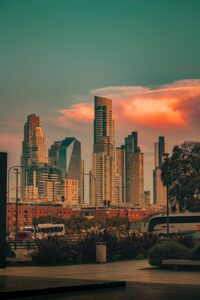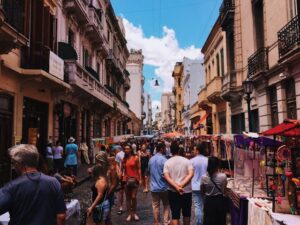Argentina has officially joined the ranks of countries offering citizenship through investment or golden visa. Non-residents can obtain Argentine citizenship by making a qualified investment of at least US $500,000.
Investments may be directed into approved sectors such as renewable energy, agriculture, technology, or infrastructure, without any residency or physical presence requirements.
This marks a radical shift in Argentina’s immigration policy, positioning it as one of the few countries worldwide to offer a direct, fast-track path to citizenship without the need for prior residence, language tests, or cultural integration.
This article breaks down the key components of Argentina’s emerging Citizenship by Investment program: how it works, who qualifies, how it compares to traditional residency paths, and what investors should weigh in terms of taxation, political risk, and long-term value.
My contact details are hello@adamfayed.com and WhatsApp +44-7393-450-837 if you have any questions.
The information in this article is for general guidance only. It does not constitute financial, legal, or tax advice, and is not a recommendation or solicitation to invest. Some facts may have changed since the time of writing.

Does Argentina have Citizenship by Investment?
Yes. Argentina now has a formal Citizenship by Investment (CBI) program. While the country previously allowed naturalization after two years of continuous legal residency, it did not offer direct citizenship in exchange for investment.
That changed when President Javier Milei’s administration issued Decree 524/2025 in May 2025, establishing a legal framework that allows foreign nationals to acquire Argentine citizenship.
This move aligns Argentina with a small group of countries that offer a fast-track, non-residency-based path to citizenship in exchange for capital, bypassing traditional immigration processes.
Argentina Citizenship by Investment Program: Golden Visa
The Argentine Citizenship by Investment Program or Golden Visa, as defined under Decree 524/2025, allows foreign nationals to obtain citizenship by making a minimum investment of US $500,000 into sectors deemed strategic by the government.
Approved sectors include agriculture, energy, technology, tourism infrastructure, and industrial production. The investment must be direct, traceable, and comply with anti-money laundering and security vetting protocols.
Key features of the program:
- No residency requirement: Applicants are not required to live in or even visit Argentina before or after acquiring citizenship.
- Timeline: Citizenship decisions are to be issued within 30 working days, following clearance by immigration, financial intelligence, and national security agencies.
- Eligibility: Open to adult foreign nationals with clean criminal records and verifiable sources of funds.
- Family inclusion: Spouses and dependent children can be included in the same application.
- Legal status: Citizenship granted under this program confers the same rights and obligations as citizenship acquired by birth or naturalization, including the right to vote, hold public office, and obtain an Argentine passport.
The new program, expected to launch formally by early 2026, promises citizenship decisions within 30 working days following background checks by national security, intelligence, financial crime, and migration authorities.
It builds on but is legally distinct from the country’s older Investor Visa (Inversionista) route, which required continuous in-country residence and only offered a pathway to naturalization after two years.
Under the new CBI model, applicants can secure an Argentine passport remotely, manage their investments offshore, and include family members in the application.
How to get Argentina Citizenship by Investment
Here’s how the process works:
- Prepare Investment Proposal: Applicants must submit a detailed investment plan demonstrating how they will inject at least US $500,000 into one or more approved economic sectors, such as agribusiness, technology, energy, tourism infrastructure, or manufacturing.
- Source of Funds Verification: Applicants must provide full financial disclosures, including documentation proving the legal origin of funds. This is mandatory to pass Argentina’s anti-money laundering (AML) and counter-terrorism financing (CTF) reviews.
- Submit Application: The application package includes personal identification, background checks, criminal records, proof of financial standing, and a formal request for citizenship based on investment.
- Security and Financial Vetting: Multiple agencies—immigration, intelligence services, financial regulators, and security forces—review the applicant’s background for any red flags. This step is non-negotiable and applies to all investors, regardless of nationality.
- Citizenship Decision: Once cleared, the applicant receives full Argentine citizenship within 30 working days. This includes a national ID and passport. There is no requirement for physical residence at any stage.
- Post-Investment Monitoring (expected but not confirmed): While the decree does not mandate ongoing audits, there may be regulations requiring proof that the investment was made and maintained, especially if the funds are transferred after citizenship is granted.
This route bypasses traditional residency-based naturalization entirely and offers one of the fastest timelines for acquiring second citizenship in Latin America.
Argentina Investor Visa Requirements
Separate from the CBI route, Argentina also offers a Temporary Investor Visa, known locally as the Visa de Inversionista, which provides residency, not immediate citizenship, in exchange for a smaller capital commitment.
This visa is ideal for small-scale investors or entrepreneurs seeking a gradual path to citizenship with active involvement in the Argentine economy. It is not a shortcut and does not offer remote eligibility.
Is it easy to get citizenship in Argentina?

Compared to most countries, yes. Argentina offers one of the most accessible citizenship processes in the world, particularly through naturalization.
The bar is low in legal terms: just two years of continuous legal residency, basic proof of integration (such as work, address, or family ties), and a clean criminal record. There’s no language test, no requirement to renounce your previous citizenship, and no mandatory cultural exams.
The process is judicial rather than administrative, meaning you apply directly through federal court rather than through an immigration office.
How long does it take to become a citizen of Argentina?
The fastest path to become an Argentine citizen is the investment route, assuming you meet the US $500,000 minimum and pass background checks.
For everyone else, naturalization is still fairly efficient but far more dependent on residence and bureaucracy.
- Citizenship by Investment: Under the CBI program launched in 2025, the processing time is just 30 working days after all vetting is complete. There’s no residency requirement, no naturalization delay, and no need to live in Argentina. It’s one of the fastest routes to citizenship globally.
- Naturalization via Residency: For most people, this is still the standard route:
- 2 years of continuous legal residency are required before you’re eligible to apply.
- After filing, the court process can take anywhere from 6 months to 2 years, depending on the court backlog, documentation, and the judge’s approach.
- In total, naturalization typically takes 2.5 to 4 years from the start of your residency to receiving citizenship.
- By Descent or Birth: If you qualify through Argentine parents or grandparents, the timeline can be much shorter—usually just a few months for documentation and approval.
Overall, the time frame depends entirely on the path you choose.
Should I Invest in Argentina?
Benefits:
- Low Cost of Entry: A US $500,000 threshold for citizenship is modest compared to programs in Europe or the Caribbean.
- Strategic Sectors: Agriculture, lithium mining, renewables, and fintech are all booming. Argentina holds the world’s second-largest lithium reserves and vast agribusiness potential.
- Favorable Talent Pool: Strong engineering and tech sectors, with a highly educated and affordable workforce.
- Regional Access: Argentine citizens can live and work across MERCOSUR, including Brazil, Uruguay, and Paraguay, offering regional mobility.
- CBI Law is Codified: The citizenship program has formal legal status making it more stable than many golden visa offerings.
Drawbacks:
- Political Instability: Frequent policy swings. The Milei government is pro-market, but a change in leadership could reverse key investor protections.
- Currency Risk: The peso remains weak and unstable, and currency controls can trap capital or complicate profit repatriation.
- Inflation and Regulation: Inflation regularly exceeds 100% annually, and regulatory frameworks are complex, inconsistent, and often politicized.
- Legal Enforcement: The courts are slow, and contract enforcement can be unpredictable, especially for foreign investors with no local partners.
Argentina offers a high-risk, high-reward environment. If you’re chasing citizenship and global mobility at a reasonable price, with minimal presence required, the new CBI program is compelling.
But if your primary goal is return on investment or long-term business expansion, tread carefully. Political risk, currency instability, and administrative opacity make Argentina a bet that needs both local expertise and legal insulation.
For more personalized guidance, it is recommended to seek a trusted expat financial advisor.
FAQs
Does Argentina allow multiple citizenship?
Yes. Argentina explicitly allows multiple citizenships, both in law and in practice. Argentina is a signatory to several bilateral agreements that influence how dual nationals are treated when traveling, especially with countries like Italy, Spain, and Chile.
In most cases, however, dual citizens are simply required to enter and exit Argentina using their Argentine passport, much like the policy in the US or EU.
Will becoming a resident or citizen make me liable for worldwide taxation in Argentina?
It depends on your tax residency, not just your immigration status.
Argentina taxes worldwide income, but only if you are classified as a tax resident. You’re considered a tax resident if you spend more than 183 days per calendar year in Argentina, or if your center of vital interests (i.e. home, family, business base) is in Argentina even if you’re abroad for part of the year.
Can I manage my investment remotely while living outside the country?
Yes. If you’re applying through the Citizenship by Investment (CBI) program, you can manage your investment entirely from abroad. The 2025 CBI framework does not require physical presence, residency, or local business operation.
Your funds must be traceable, legally sourced, and directed into a qualified sector, but there’s no obligation to reside in Argentina or oversee the business in person.
Remote management via agents, local partners, or corporate structures is allowed, provided the investment remains compliant and active.
Pained by financial indecision?

Adam is an internationally recognised author on financial matters with over 830million answer views on Quora, a widely sold book on Amazon, and a contributor on Forbes.



